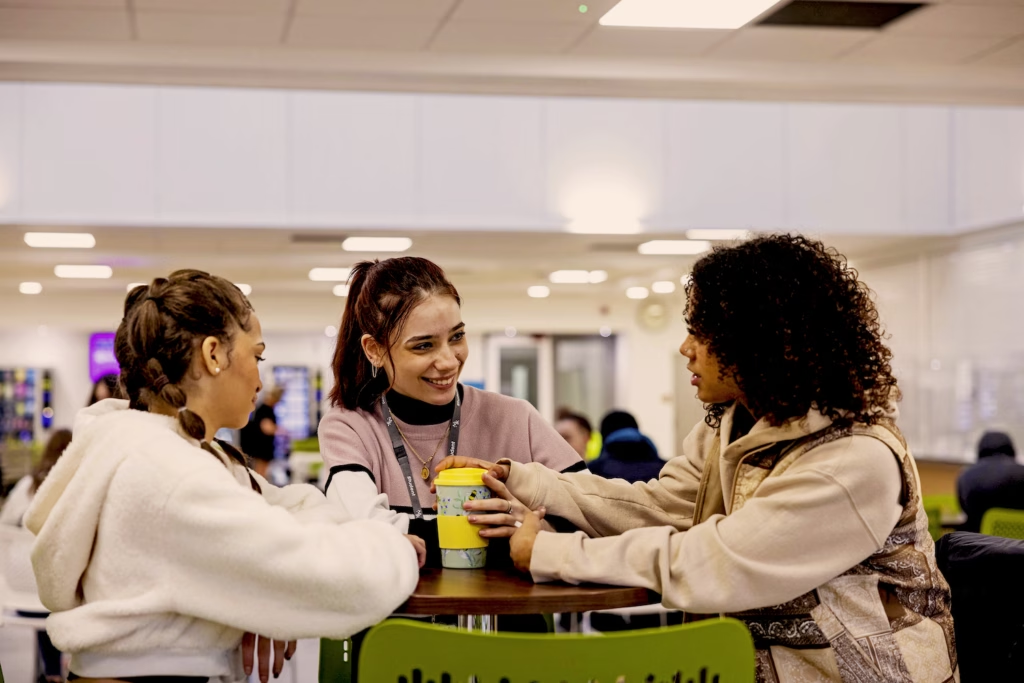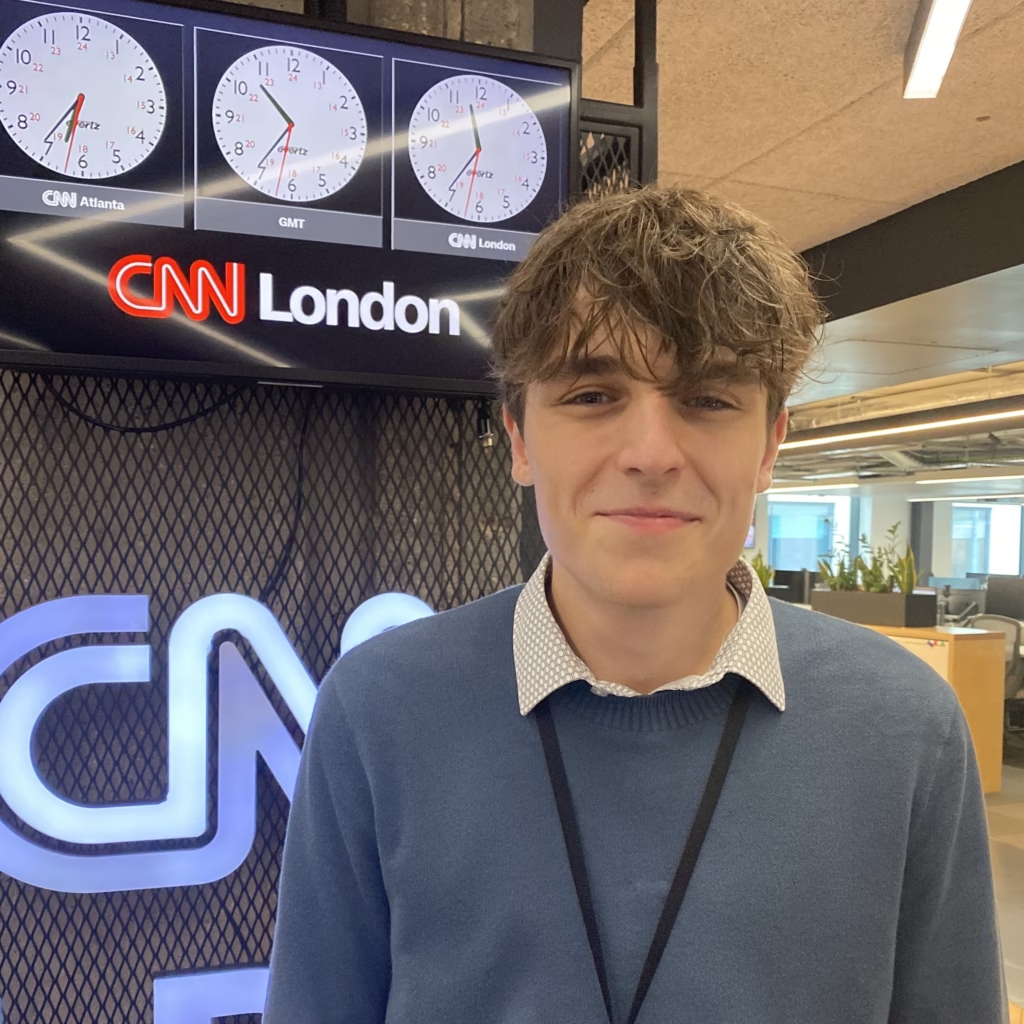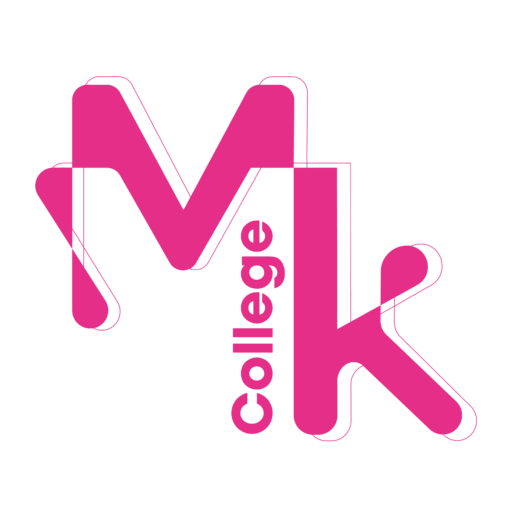
Aspiring TV journalist gains experience and insight at MK College

At Milton Keynes College, you can shape your study experience to match your personal interests and career aspirations. Throughout his Media Production course, Oliver focused on creating documentaries, which supported his journey towards a career in media and helped him secure an internship with CNN.
Read more to hear about Oliver’s college experience and career aspirations within the media industry.
Hi! What’s your name and what did you study at the College?
Hi! I’m Oliver and I studied Media Production for two years.
What motivated you to choose this course?
I did a Media Studies GCSE and it was heavy on the writing side; I wanted to do something practical and since I was eight, I’ve wanted to be a TV presenter. The Media Production course aligned with that goal and I was already creating bits and bobs on YouTube, so MK College felt the right kind of place for me.
My mum supported me with my choice to apply for MK College; this was important because my school mostly talked to us about A Levels but I felt sure that practical experience at college would help me to pursue a career in a creative field. It was nice to have my mum’s support to ground me and encourage me to follow my goals.
What is your next step now that you’ve completed your course?
I’m starting a six-month internship at CNN this month. In January, our course leader encouraged us to find apprenticeships and university courses: we were given a six-week period to figure out what to do next year. I wrote applications to 12 apprenticeships, which my course leader helpfully reviewed. It’s good that we were encouraged to make the applications because a lot of students were thinking about doing a gap year. Instead, we were encouraged to make long-term plans.
At the interview, CNN were really impressed with the film I made for my course this year, so that obviously played a massive part in me securing the internship.
How did you find your studies? Do you feel that you made the right choice?
I loved the two years, it was brilliant. Luke is probably the best teacher I’ve ever had – he has such a wealth of knowledge about the media industry. Being able to make films for the course was great, as was getting detailed, constructive feedback from the tutors. This meant that I could make each film better than the last; you can really see the progression from film to film.
The first year was more structured to get everyone up to speed. We did units on topics advertising and short films. I spent the whole two years making documentaries, for example on ultra-processed foods and knife crime. You were given 11 or 12 weeks to get locked into a subject, which was probably one of the best parts about the course.
Did you work alongside your studies? How did you balance your schedule?
Yes, I had two jobs which worked out because the classes were on three days a week. I would go to classes during the morning and then work in a store during the evenings. On some of the days off I worked in a café.
For our film projects, we were given twelve weeks per film, so I set myself mini deadlines to keep my work on track. Sometimes I had a lot to do in the last few weeks before a deadline but otherwise the study-work-life balance was good, and I had time to do things outside of work and college. These deadlines felt like what would be expected in the workplace. I wasn’t managed at every step of the process, and I was in charge of my own schedule, which is what it’ll be like at CNN and university.
What were some of the highlights from your courses?
I directed and edited leadership news broadcasts for the College’s internal news channel. It was great, because it was eight months of professional experience, which allowed for some creative freedom as well, such as making motion graphics and directing the camera operators in a studio.
The facilities in Media at the College are brilliant – they have cinema-quality cameras which you can be trained to use. My friends in sixth form who studied film studies learned the same principles but filmed using their iPhones, which isn’t common in the film industry – you need to know how to use a camera.
What are some of the challenges you encountered in your studies and how did you overcome them?
My only deadline blunder where I needed an extension was when I agreed to film and edit two films for another college department as a favour. The deadlines for the films and my own assignment were on the same day – I prioritised the favour and felt worried about my deadline.
The College were great: I came in during the assessment week and got all my assessments and evaluation done. It was great, because I was given the opportunity to go the extra mile and help another department. It didn’t mean that I had to sacrifice quality on either piece of work.
What are your future career aspirations?
CNN’s next – that’s going to be an exciting chapter! I have been given a deferred place in Multimedia Journalism at Bournemouth University for next year, which will be good because it will help me gain the NCTJ qualification which is helpful in journalism.
I’d quite like to be a correspondent on the news – either being a TV presenter for a specific subject or in another country. Alternatively, I’d like to be a content producer for the news. I think those roles can be found along the same journey – you have to prove yourself before getting to be in front of a camera.
What advice would you give to someone wanting to apply for your course today?
Firstly, the is about studying and producing a range of content, not just fictional films. For example, if you want to be a TV presenter, you can literally make your own opportunities by putting yourself in front of the camera.
Also, never say no to an opportunity. I said yes to everything no matter what it was, including going to a Red Bull event where I helped out by interviewing lots of new people. It was a great, confidence-building experience.
Lastly, get good at asking for help. College is more independent than A Levels but there is support available – the staff are brilliant and there to help you.
Learn more about Media Production at Milton Keynes College by reading more here.
